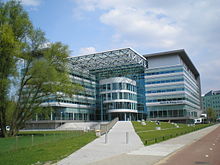David de Wied
David de Wied (born January 12, 1925 in Deventer , † February 21, 2004 in Utrecht ) was a Dutch physician ( endocrinology ). He is known for interdisciplinary research on neuropeptides .
Due to the Second World War, during which he had to go underground as a Jew, he did not study medicine at the University of Groningen until 1947 , where he received his doctorate in 1952. In 1955 he graduated as a doctor. From 1958 he was lecturer and from 1961 professor for experimental endocrinology (experimental pharmacology) at the University of Utrecht and from 1963 professor for pharmacy and director of the Rudolf Magnus Institute. In 1990 he retired, but remained scientifically active at the institute.
He demonstrated the influence of the pituitary hormones ACTH , vasopressin and MSH on the ability to learn. He demonstrated changes in behavior after removing parts of the pituitary gland, which were reversed when the hormones were administered. ACTH, for example, is a stress hormone and controls fear reactions, recognizable for example in active and passive avoidance learning.
In 1996 he received the AH Heineken Prize for Medicine . He was a member of the Royal Netherlands Academy of Sciences, whose science department he headed from 1981 to 1984 and whose president he was from 1984 to 1990. He was Knight of the Dutch Lion and Commander of the Order of Orange-Nassau . A faculty building at Utrecht University is named after him.
He was a co-founder of the European Journal of Pharmacology .
Web links
| personal data | |
|---|---|
| SURNAME | Wied, David de |
| BRIEF DESCRIPTION | Dutch doctor, pharmacologist and university professor |
| DATE OF BIRTH | January 12, 1925 |
| PLACE OF BIRTH | Deventer |
| DATE OF DEATH | February 21, 2004 |
| Place of death | Utrecht |
